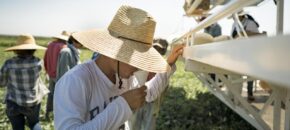Asparagus growers should consider scouting their fields regularly during the summer months for foliar disease development. Important pathogens that growers need to scout for on a regular basis include Purple spot, Cercospora, and Rust.
Continue reading...Beat the Heat: Clothing Matters

Evaporation of sweat from skin is the body’s primary mode of temperature regulation on hot days. Clothing can impact heat and sweat production, as well as the rate of evaporation, so clothing decisions are important to prevent heat stress. Choose lightweight, loose-fitting clothing made of a breathable fabric like cotton which allows sweat to […]
Continue reading...Blunt-nosed Leafhoppers in Cranberries – 2024

New Jersey cranberry growers are increasingly concerned about rising blunt-nosed leafhopper (BNLH) populations. This rise is attributed to changes in pest management strategies, such as the adoption of new reduced-risk products and decreased use of broad-spectrum insecticides, as well as the expansion of high-yielding varieties that seem more susceptible. BNLH is particularly worrisome because it […]
Continue reading...Controlling white mold in spring crops
White mold, or lettuce drop, caused by Sclerotinia sclerotiorum, can cause serious losses in lettuce and other susceptible crops if left uncontrolled. Disease development is favored by wet, humid conditions (especially in high tunnels and fields) with known histories of the disease.
Continue reading...Bacterial leaf spot control and copper resistance in pepper and tomato
Copper resistance in bacterial leaf spot of tomato and pepper crops has been detected at a high level in New Jersey the past few summers. While not surprising, copper resistance has been known to develop for decades now. Copper applications for the control of bacterial diseases in many crops has been a mainstay for decades […]
Continue reading...Edema development in brassica crops
Edema is often expressed as off-color swellings or galls that appear on leaves and stems. Edema develops when epidermal cells hold excessive water due to a slowing of evapotransporation when hot, muggy days are followed by cooler, wetter weather. Edema develops because the plant takes in more water (due to a high soil moisture content) […]
Continue reading...